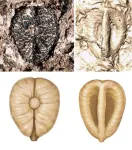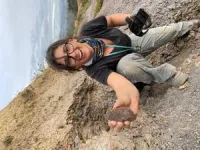(Press-News.org) If you’ve ever snacked on raisins or enjoyed a glass of wine, you may, in part, have the extinction of the dinosaurs to thank for it. In a discovery described in the journal Nature Plants, researchers found fossil grape seeds that range from 60 to 19 million years old in Colombia, Panama, and Peru. One of these species represents the earliest known example of plants from the grape family in the Western Hemisphere. These fossil seeds help show how the grape family spread in the years following the death of the dinosaurs.
“These are the oldest grapes ever found in this part of the world, and they’re a few million years younger than the oldest ones ever found on the other side of the planet,” says Fabiany Herrera, an assistant curator of paleobotany at the Field Museum in Chicago’s Negaunee Integrative Research Center and the lead author of the Nature Plants paper. “This discovery is important because it shows that after the extinction of the dinosaurs, grapes really started to spread across the world.”
It’s rare for soft tissues like fruits to be preserved as fossils, so scientists’ understanding of ancient fruits often comes from the seeds, which are more likely to fossilize. The earliest known grape seed fossils were found in India and are 66 million years old. It’s not a coincidence that grapes appeared in the fossil record 66 million years ago–that’s around when a huge asteroid hit the Earth, triggering a massive extinction that altered the course of life on the planet. “We always think about the animals, the dinosaurs, because they were the biggest things to be affected, but the extinction event had a huge impact on plants too,” says Herrera. “The forest reset itself, in a way that changed the composition of the plants.”
Herrera and his colleagues hypothesize that the disappearance of the dinosaurs might have helped alter the forests. “Large animals, such as dinosaurs, are known to alter their surrounding ecosystems. We think that if there were large dinosaurs roaming through the forest, they were likely knocking down trees, effectively maintaining forests more open than they are today,” says Mónica Carvalho, a co-author of the paper and assistant curator at the University of Michigan’s Museum of Paleontology. But without large dinosaurs to prune them, some tropical forests, including those in South America, became more crowded, with layers of trees forming an understory and a canopy.
These new, dense forests provided an opportunity. “In the fossil record, we start to see more plants that use vines to climb up trees, like grapes, around this time,” says Herrera. The diversification of birds and mammals in the years following the mass extinction may have also aided grapes by spreading their seeds.
In 2013, Herrera’s PhD advisor and senior author of the new paper, Steven Manchester, published a paper describing the oldest known grape seed fossil, from India. While no fossil grapes had ever been found in South America, Herrera suspected that they might be there too.
“Grapes have an extensive fossil record that starts about 50 million years ago, so I wanted to discover one in South America, but it was like looking for a needle in a haystack,” says Herrera. “I've been looking for the oldest grape in the Western Hemisphere since I was an undergrad student.”
But in 2022, Herrera and his co-author Mónica Carvalho were conducting fieldwork in the Colombian Andes when a fossil caught Carvalho’s eye. “She looked at me and said, ‘Fabiany, a grape!’ And then I looked at it, I was like, ‘Oh my God.’ It was so exciting,” recalls Herrera. The fossil was in a 60-million-year-old rock, making it not only the first South American grape fossil, but among the world’s oldest grape fossils as well.
The fossil seed itself is tiny, but Herrera and Carvalho were able to identify it based on its particular shape, size, and other morphological features. Back in the lab, they conducted CT scans showing its internal structure that confirmed its identity. The team named the fossil Lithouva susmanii, “Susman’s stone grape,” in honor of Arthur T. Susman, a supporter of South American paleobotany at the Field Museum. “This new species is also important because it supports a South American origin of the group in which the common grape vine Vitis evolved,” says co-author Gregory Stull of the National Museum of Natural History.
The team conducted further fieldwork in South and Central America, and in the Nature Plants paper, Herrera and his co-authors ultimately described nine new species of fossil grapes from Colombia, Panama, and Perú, spanning from 60 to 19 million years old. These fossilized seeds not only tell the story of grapes’ spread across the Western Hemisphere, but also of the many extinctions and dispersals the grape family has undergone. The fossils are only distant relatives of the grapes native to the Western Hemisphere and a few, like the two species of Leea are only found in the Eastern Hemisphere today. Their places within the grape family tree indicate that their evolutionary journey has been a tumultuous one. “The fossil record tells us that grapes are a very resilient order. They're a group that has suffered a lot of extinction in the Central and South American region, but they also managed to adapt and survive in other parts of the world,” says Herrera.
Given the mass extinction our planet is currently facing, Herrera says that studies like this one are valuable because they reveal patterns about how biodiversity crises play out. “But the other thing I like about these fossils is that these little tiny, humble seeds can tell us so much about the evolution of the forest,” says Herrera.
This study was authored by Fabiany Herrera (Field Museum), Mónica Carvalho (University of Michigan), Gregory Stull (National Museum of Natural History, Smithsonian Institution), Carlos Jarramillo (Smithsonian Tropical Research Institute), and Steven Manchester (Florida Museum of Natural History, University of Florida).
###
END
Sixty-million-year-old grape seeds reveal how the death of the dinosaurs may have paved the way for grapes to spread
Scientists describe nine new species of fossil grapes (60 to 19 million years old), including the oldest ones ever found in the Western Hemisphere
2024-07-01
ELSE PRESS RELEASES FROM THIS DATE:
AI model finds the cancer clues at lightning speed
2024-07-01
Researchers at the University of Gothenburg have developed an AI model that increases the potential for detecting cancer through sugar analyses. The AI model is faster and better at finding abnormalities than the current semi-manual method.
Glycans, or structures of sugar molecules in our cells, can be measured by mass spectrometry. One important use is that the structures can indicate different forms of cancer in the cells.
However, the data from the mass spectrometer measurement must be carefully analysed by humans to work out the structure from the glycan fragmentation. This process can take anywhere from hours ...
Individuals can tell if their memories are trustworthy, new study shows
2024-07-01
How much trust should we put in our memories? New research shows we have a good awareness of when we are recalling events accurately – and when our brain is filling in gaps with general knowledge.
Memories are a blend of recalled details and ‘prototypical’ information, but a study at the University of Birmingham has shown that when prototypes appear more prominent, we become less confident in the recollection.
This means that we are able to distinguish between these two types of memory, and accurately assess how ...
Palliative care beneficial to manage symptoms, improve quality of life for people with CVD
2024-07-01
Statement Highlights:
Palliative medication management focuses on providing relief from symptoms and enhancing quality of life for people with cardiovascular disease throughout the various stages of the disease.
Decisions about initiating, adjusting or discontinuing cardiovascular and other medicines should be patient-centered and include input from multiple specialties including cardiology experts in close collaboration with primary care professionals.
Evidence shows that adding palliative care interventions to standard cardiovascular ...
How researchers are using digital city-building games to shape the future
2024-07-01
Lancaster University researchers have come up with exciting and sophisticated new mapping technology enabling future generations to get involved in creating their own future built landscape.
They say, in their new research published today, that planners are missing a real trick when it comes to encouraging and involving the public to help shape their own towns, cities and counties for the future.
They also say that games platforms can be used to plan future cities and also help the public immerse themselves in these future worlds.
The researchers have modified Colossal Order’s game ‘Cities: Skylines’ ...
New professorship for Large Engines Research at Graz University of Technology
2024-07-01
Large engines are essential for the global transport and energy sector, powering container ships, locomotives, decentralised power plants and heavy construction machinery. In many areas, battery-powered electric engines are not feasible, which is why the further development of large combustion engines is a key factor for meeting climate protection targets: through greater efficiency, but above all by using new, climate-neutral fuels. In order to strengthen research and the training of specialists in this field, Graz University of Technology ...
Choose where to plant energy crops wisely to minimise loss of biodiversity, says new study
2024-07-01
In the fight to protect biodiversity and limit climate change, the world will reap what it sows, say researchers from the University of Surrey.
Energy crops can be used for heat, electricity and even biofuels like bioethanol. They will become more important as the world transitions away from fossil fuels. In a new study, researchers from Surrey have shown that where you choose to plant energy crops makes a big difference to biodiversity.
A detailed analysis has shown that planting energy crops on existing agricultural land in places like China and Central Europe could minimise harm to biodiversity ...
Addiction: Biased choice not a chronic brain disease, research suggests
2024-07-01
Addiction is not simply a chronic brain disease and considering it as such can limit treatment options and increase stigma, an extensive research review suggests.
After decades of research, Professor of Developmental Psychopathology Reinout W. Wiers suggests that while in some extreme cases addition can be considered a chronic brain disease, in most cases it should be considered as biased choice.
According to in-depth research examined in new book A New Approach to Addiction and Choice, portraying addiction as a chronic brain disease reduces confidence in the possibility of lasting change, in both the addict themselves and the therapist.
What does science say?
The ...
Intake of ultra-processed foods linked with increased risk of death
2024-06-30
Chicago (June 30, 2024) — In a new study, older adults who reported consuming higher amounts of ultra-processed foods, as defined by the NOVA classification system, were about 10% more likely to die over a median follow-up of 23 years compared with those who consumed less processed food.
The findings are based on a large study that has tracked over half a million U.S. adults for nearly three decades. According to the results, higher intake of ultra-processed foods was associated with modest increases in death from any cause and from deaths related specifically to heart ...
Limiting ultra-processed foods does not necessarily make for a healthy diet
2024-06-30
Chicago (June 30, 2024) — A new study demonstrates that eating primarily minimally processed foods, as they are defined by the NOVA classification system, does not automatically make for a healthy diet, suggesting that the types of foods we eat may matter more than the level of processing used to make them.
Comparing two menus reflecting a typical Western diet — one emphasizing minimally processed foods and the other emphasizing ultra-processed foods, as categorized by the NOVA classification system — the researchers found that ...
Research uncovers heart-protective eating patterns for type 1 diabetes
2024-06-30
Chicago (June 30, 2024) — Eating patterns that align with the Mediterranean diet or the dietary approaches to stop hypertension (DASH) diet could help lower cardiovascular disease risk in adults with type 1 diabetes, according to results from a six-year study.
The DASH and Mediterranean diets are both considered heart-healthy and emphasize plant-based foods, healthy fats, lean proteins and low intake of processed foods and sugars.
“Type 1 diabetes increases the risk of developing cardiovascular disease, which raises the ...
LAST 30 PRESS RELEASES:
Asteroid samples offer new insights into conditions when the solar system formed
Fecal transplants from older mice significantly improve ovarian function and fertility in younger mice
Delight for diastereomer production: A novel strategy for organic chemistry
Permafrost is key to carbon storage. That makes northern wildfires even more dangerous
Hairdressers could be a secret weapon in tackling climate change, new research finds
Genetic risk for mental illness is far less disorder-specific than clinicians have assumed, massive Swedish study reveals
A therapeutic target that would curb the spread of coronaviruses has been identified
Modern twist on wildfire management methods found also to have a bonus feature that protects water supplies
AI enables defect-aware prediction of metal 3D-printed part quality
Miniscule fossil discovery reveals fresh clues into the evolution of the earliest-known relative of all primates
World Water Day 2026: Applied Microbiology International to hold Gender Equality and Water webinar
The unprecedented transformation in energy: The Third Energy Revolution toward carbon neutrality
Building on the far side: AI analysis suggests sturdier foundation for future lunar bases
Far-field superresolution imaging via k-space superoscillation
10 Years, 70% shift: Wastewater upgrades quietly transform river microbiomes
Why does chronic back pain make everyday sounds feel harsher? Brain imaging study points to a treatable cause
Video messaging effectiveness depends on quality of streaming experience, research shows
Introducing the “bloom” cycle, or why plants are not stupid
The Lancet Oncology: Breast cancer remains the most common cancer among women worldwide, with annual cases expected to reach over 3.5 million by 2050
Improve education and transitional support for autistic people to prevent death by suicide, say experts
GLP-1 drugs like Ozempic could cut risk of major heart complications after heart attack, study finds
Study finds Earth may have twice as many vertebrate species as previously thought
NYU Langone orthopedic surgeons present latest clinical findings and research at AAOS 2026
New journal highlights how artificial intelligence can help solve global environmental crises
Study identifies three diverging global AI pathways shaping the future of technology and governance
Machine learning advances non targeted detection of environmental pollutants
ACP advises all adults 75 or older get a protein subunit RSV vaccine
New study finds earliest evidence of big land predators hunting plant-eaters
Newer groundwater associated with higher risk of Parkinson’s disease
New study identifies growth hormone receptor as possible target to improve lung cancer treatment
[Press-News.org] Sixty-million-year-old grape seeds reveal how the death of the dinosaurs may have paved the way for grapes to spreadScientists describe nine new species of fossil grapes (60 to 19 million years old), including the oldest ones ever found in the Western Hemisphere





